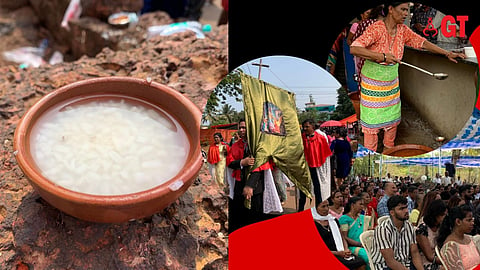

Lizi Fernandes and her grandson were caught in the crowd as they were rushing to get pez, a traditional Goan rice gruel, served after the Eucharistic service at the Chapel of Our Lady of Annunciation in Siridão, today (Sunday).
This scramble for pez adds a unique element to the annual Jezu Nazare feast (Jesus of Nazareth) or Pejechem Fest where people come to celebrate their faith, while some come with devotion to seek intercession for a good and healthy life.
“I was born and raised in this village and after I got married, we shifted to Mumbai. I’ve come here after many years, with my daughter and her son. Things have changed so much, there are so many people who attend mass here and they come from different parts of Goa,” she said while walking towards the queue with a container for the pez.
HOMECOMING FOR MANY
The usually quaint and serene village of Siridão transforms into a bustling place during the Pejechem Fest which is a real homecoming celebration for many of the families from the village now settled in the UK and other countries. Among them is the Fernandes family who returned from Swindon to be here on time for the feast.
“We couldn’t come the previous years, but made it a point to come this time. The feast means a lot to us because we have seen miraculous events taking place,” says Mr Fernandes, as he places two stacks of water bottles on his compound wall for the devotees to beat the heat.
BEYOND RELIGIOUS BOUNDARIES
The enduring spirit of the Jezu Nazare feast transcends religious boundaries with the Hindu brethren working round the clock on the feast day to serve pez to the devotees.
For the last 20 years, Gajanand Kavlaikar has been helping his wife and family to make pez to be served to the devotees.
We start by boiling the water in seven modkis (copper vessels) at 12 midnight and we use around 200 kgs of parboiled rice (ukadde tandul) which is cooked in these pots.
Gajanand Kavlaikar, who has been serving Pez to the devotees
“We start by boiling the water in seven modkis (copper vessels) at 12 midnight and we use around 200 kgs of parboiled rice (ukadde tandul) which is cooked in these pots. Earlier, my father-in-law used to do it, now I too help,” shares Gajanand, as he pours piping hot pez, also called canji, into an earthen pot.
Listening to Gajanand talk, 73-year-old Milagrin from Candolim, says, “Before they would prepare the pez in a pandal (mattow) but recently a permanent structure has been erected.”
If the involvement of Hindu brethren speaks of interfaith harmony, then equally commendable is the largesse of the Dempo family towards the expenditure for preparing the pez and distributing it.
According to locals, the property is termed as pensanvachem bhatt for which the landlord has to compensate with acts of kindness. Faithful who attend the feast keep vows (angvons) and also make vows to get cured and healed.
It’s holy, so at the start of the day, I will give pez to my family members. It's faith that pulls me to this feast.
Milgarin, a devotee
PEZ, THE MIRACLE GRUEL
“I had come here and prayed for my health and things have got a lot better ever since,” says Milgarin, who believes in the miracle of the simple and humble pez that has nurtured generations of Goans to better health.
Milagrin never went back empty-handed from Siridao. In a steel container, she filled pez for her family. “It’s holy, so at the start of the day, I will give pez to my family members. It's faith that pulls me to this feast. I and my family will continue coming here till we can,” she says as she walks towards the Siridao bus stop to catch a bus to Panjim from where she will travel to Candolim.
For Milagrin and many others, the pez is a symbol of something beyond just a meal. It is more about unwavering faith and deep devotion many feel towards this annual celebration.